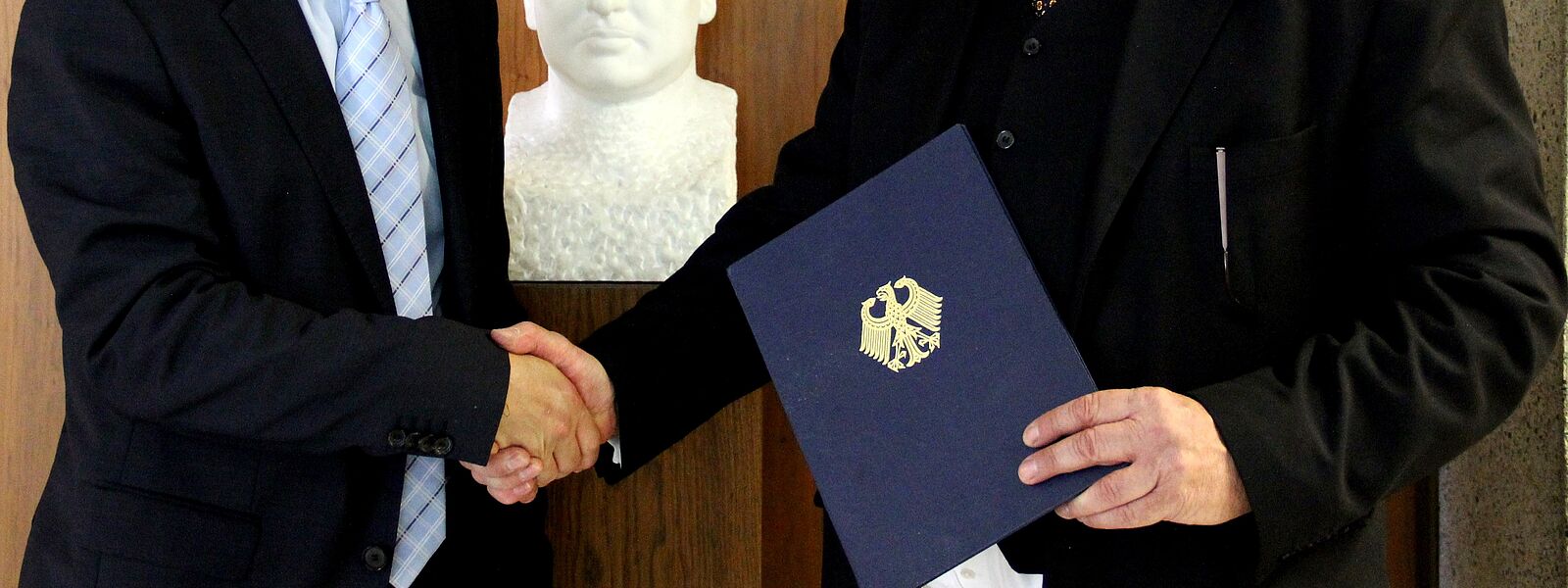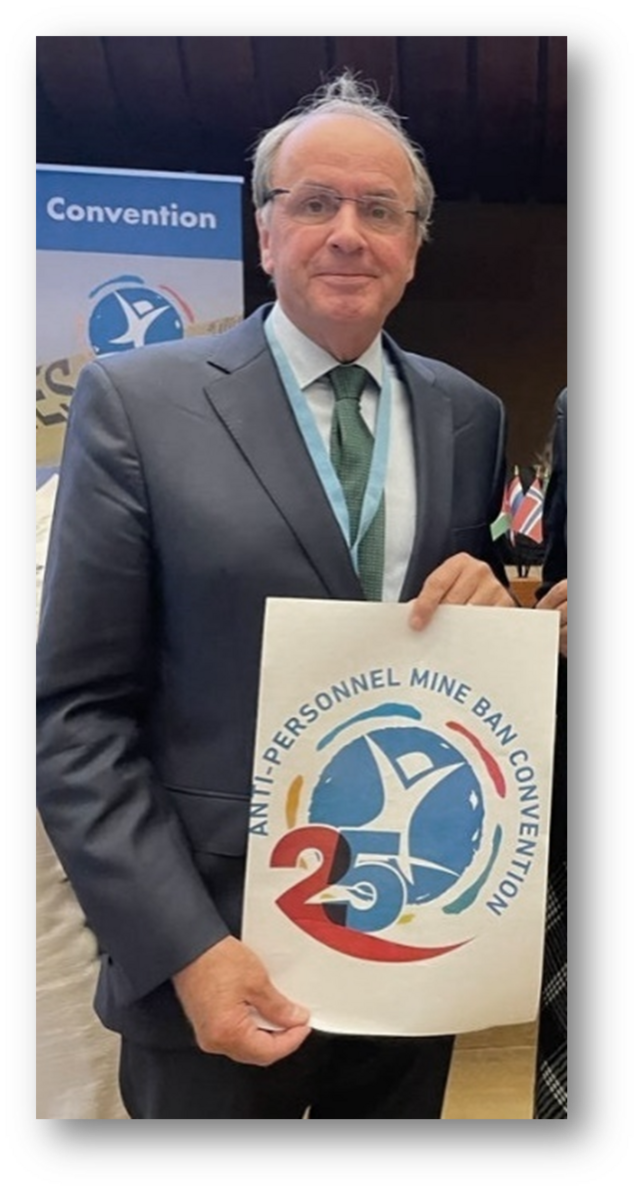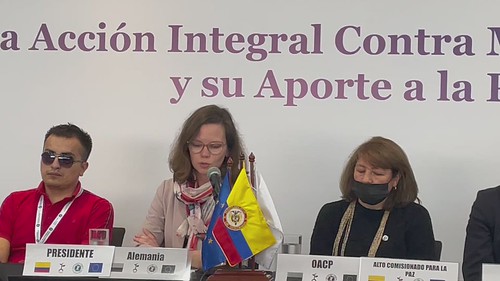
Germany
Germany signed the Convention on 3 December, ratified it on 23 July 1998, with the Convention entering into force for Germany on 1 March 1999.
Obligations under the Convention
In its initial transparency report submitted on 31 August 1999, Germany reported that it had stockpiled anti-personnel mines.
Notwithstanding the obligation to destroy all stockpiled anti-personnel mines, the Convention permits the retention of the minimum number of anti-personnel mines absolutely necessary for the development of and training in mine detection, mine clearance, or mine destruction techniques.
As of 2021, Germany reported having retained 543 mines for research and testing purposes, for training of mine and explosive ordnance detection dogs, vehicle mine protection programme, accident research and regular dog training.
In its initial transparency report submitted on 31 August 1999, Germany reported that it had completed the destruction of all stockpiled anti-personnel mines in 1997.
In total, Germany reported having destroyed 1,700,000 mines.
In June 2011 (i.e., after Germany’s original deadline to implement Article 5 had expired), Germany informed the Convention’s Standing Committee on Mine Clearance that it had discovered a previously unknown area under its jurisdiction suspected to contain anti-personnel mines.
In 2012, in submitting updated information, as required by Article 7 of the Convention, on the location of all mined areas that contain or are suspected to contain anti-personnel mines under Germany’s jurisdiction or control, Germany formally reported the former military training area Wittstock in the north of the federal state of Brandenburg, as an area suspected to contain anti-personnel mines.
On 15 April 2013, Germany, in accordance with decisions of the Twelfth Meeting of the States Parties on the matter of previously unknown mined areas, submitted a request for a deadline to implement its Article 5 obligation.
On 6 November 2013, Germany withdrew its request as historical research, technical survey and clearance of sample areas did not confirm the suspicion of any anti-personnel mines in the former military training area.
Article 6 of the Convention indicates that “Each State Party in a position to do so shall provide assistance for mine clearance and related activities […], the care and rehabilitation, and social and economic reintegration, of mine victims and for mine awareness programs […], the destruction of stockpiled anti-personnel mines, […] with a view to ensuring the full and prompt implementation of agreed assistance programs.”
In this regard Germany routinely engages in such cooperation and assistance. The latest statement on Article 6 for this State Party can be found on this page.
Annually and no later than 30 April, each State Party is to update information covering the previous calendar year. The latest Article 7 reports for this State Party can be found on this page.
Each State Party is to take all appropriate legal, administrative and other measures, including the imposition of penal sanctions, to prevent and suppress any activity prohibited to a State Party under this Convention undertaken by persons or on territory under its jurisdiction or control.
Germany has reported having established national implementation measures or that it considers existing legislation to be sufficient.
Presidency
The Twenty-First Meeting of the States Parties (21MSP) will be presided by H.E. Thomas Göbel, Ambassador of the Republic of Germany to the Conference on Disarmament elected in 2022, at the conclusion of the Twentieth Meeting of the States Parties in Geneva.
In December 2022, the President shared the areas of priority for the presidency,

View, download snapshots of Germany during Convention-related activities on Flickr.
Latest Views and Updates
- IM24 4 Coop Germany18 June 2024English
- 21MSP 10c Coop Germany23 November 2023English
- IM23 5 Coop Germany21 June 2023English
- 18MSP 9c Coop Germany19 November 2020English
- 17MSP 9c Coop Germany29 November 2018English
- PledgingConference 2018 Germany27 February 2018English
- 16MSP 11c Committee Cooperation and Assistance Germany21 December 2017English
- IM17 04 Cooperation and Assistance Germany8 June 2017English
- 2PC Germany28 February 2017English
- 15MSP 10c Germany Cooperation and Assistance30 November 2016English
- 2025 Germany Art7Report for202431 March 2025English
- 2024 Germany Art7Report for202328 March 2024English
- 2023 Germany Art7Report for202231 March 2023English
- 2022 Germany Art7Report31 March 2022English
- 2021 Germany Article724 March 2021English
- 2020 Germany Art7Report16 March 2020English
- 2019 Germany Art7Report3 April 2019English
- 5RC 8a Universalization Germany27 November 2024English
- 21MSP 8 General Statements Germany24 November 2023English
- 21MSP 10f Universalization Germany24 November 2023English
- IM23 7a Universalization Germany21 June 2023English
- 5RC Letter from the 21MSP President3 April 2023English
- 20MSP 8 General Statements Germany21 November 2022English
- 19MSP 10f Universalization Germany18 November 2021English
- 17MSP 7 General Statements Germany26 November 2018English
- 2017-20 year anniversary negotiation adoption and signing15 September 2017English
- 15MSP 08 Germany General Statements28 November 2016English
- Text der Ottawa-Konvention1 March 1999Español


